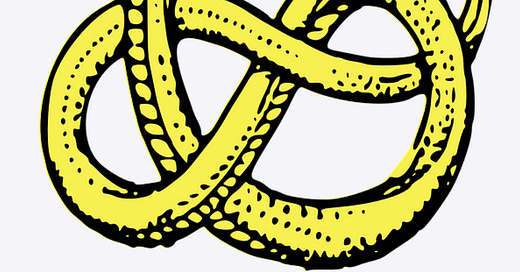When faced with an objection, how do you respond? Are you curious about it? Are you listening or giving any veracity to the complainant? Or are you just looking for a reason to make you right and them wrong?
I struggle with this myself. I self-check. I don’t assume I am right. I put what I am thinking up to the test of logic, reason, critical observation and doubt or uncertainty. It’s ok to be uncertain. It’s better not to have a quick easy answer for everything and to think about things, let ideas and thoughts marinate.
One of my favorite spiritual teachers said, “here’s a new spiritual practice for you: Don’t take your thoughts too seriously.” It allows for so much more confidence to be ok with being wrong and to allow for scrutiny of ideas rather than wrapping one’s entire identity around rigid beliefs about things that might not be completely founded.
This is another part of Qcumbers modus operandi that doesn’t work for me, when some part of the Q narrative doesn’t fit or gets questioned and there isn’t a known answer, everyone just invents a quick, new and easy answer out of thin air. A theory being rationalized by another theory. A guess being validated by a bigger guess.
If you were to point out that it’s not a good guess, the response is often, “where’d you get your science degree?” Didn’t know I needed one to be objective, rational, logical and skeptical of a guess made up just now.
The mainstream power holders do this, too. I remember hearing “it’s a novel corona virus” to every objection to power. It’s well established now two years in to be less virulent than the flu. “But it’s more contagious,” they retort. Is it? Sounds like you’re making up excuses to trample people’s rights. “Oh yeah, where’d you get your science degree?”
The “novel” virus narrative was a convenient excuse for the world govts to treat this flu season differently in a clear effort to control humanity (for the greater good). A lot of people who had more control made a lot of money. Wealth was transferred. Humanity was controlled. Those controls haven’t been rolled back now that it’s come out that as a matter of fact, the virus wasn’t really that novel.
So which is it, deadly venom destroying people’s organs out of the blue which will make people skip critical thinking and revert to the emotion of fear or bullshit PCR weaponization and ventilators (oh wait, are those venom, too?) to bolster numbers early on to make the virus appear more deadly than it was to everyone (but children). You don’t have to pick one. It might be both. But how likely is it both?
And that’s another kicker. Venom in any dose is more toxic to children, and Covid never killed children. The death toll among healthy children assessed recently is that it was essentially zero. In fact, it was probably the safest so-called virus (or whatever it was) for children in the history of respiratory viruses and flu seasons. “But it was synthesized venom.” Ok, you got me…
I hate to break it to you but there are many many many holes in this venom theory. It does not “all line up” as I have heard parroted. The data was cherry picked, I explained that in my first criticism and the symptoms that match were cherry picked and the possible correlations were cherry picked. The list goes on and on. “But it was synthesized.” To be unlike venom? I thought this whole theory was founded upon the “knowledge” that Covid, Covid cures, Remdesivir and the vaccines was reacting (or reacting to) everything like venom. Yesterday, it was mostly bullshit and today it’s 100% venom. Don’t drink the water.
I don’t drink the water. You can ask Flint about that.
The thing with all this that is the most disconcerting and disheartening to me, personally, is the unwillingness among people to be pragmatic, to scrutinize, to think critically about someone’s ideas who they see as on their side, much less themselves. So they adopt bad ideas because they want a “gotcha,” and they want their ally’s to be right. Then, they are left to contend with defending another’s views against the critical observations they themselves should have thought of in the first place before adopting them as their own. They take someone else’s thoughts as a part of their identity and as a hard fast religion.
This is the importance of learning to scrutinize one’s own thoughts and not to take them so seriously. Because as soon as one builds an identity around a theory, one is going to be up against annihilation, personal destruction at every minor query or disagreement. It makes us less tactful and able to handle disagreement which is a fact of life and relationships.
I have started to realize that telling the truth gets people angry with me, likely and understandably for this very reason. And in this way, there is a commonality with human nature and the serpent. If I say, this isn’t adding up as much as it was purported, I get “you don’t understand the science” or “you haven’t done your research” or “when did you become a scientist.” I’ve been hearing these same arguments from the unobserved majority of earth for the past two years when asking why I should give up my rights today. I did look at the research, though, and that’s why I asked. It doesn’t add up.
In response to questioning an idea, people that identify with the thoughts of others act the same as a coiled up serpent under personal attack. They lash out defensively with their own personal attacks and generally seem to want to strike back as if I am killing their sacred snake.
When does it end?




